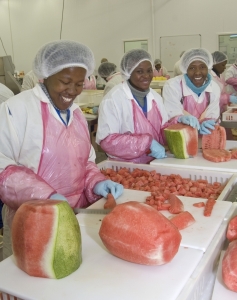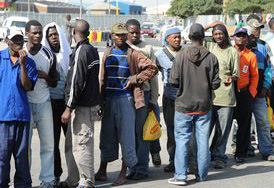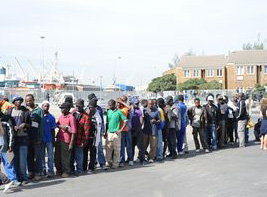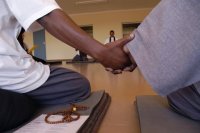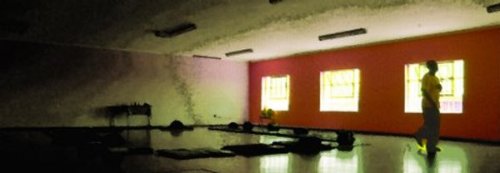
Millions are spent on building stadiums for the 2010 World Cup, while budgets for research are being cut.
It is a worrying phenomenon for the research community that research is apparently being put on hold to fund the World Cup, especially given the already dampened global economic climate.
An article by Cornia Pretorius in the July edition of the Mail and Gaurdian’s Higher Learning supplement, states: “The National Research Foundation (NRF) recently canned a joint project involving researchers from South Africa and Spain, citing a diversion of public funds to preparations for the 2010 World Cup and the global economic crisis as the primary reasons for cancellation”.
This is ironic in the context that the World Cup is premised to build the South African economy, boost job creation and promote further opportunities for international interest and collaboration. Key researchers and academics, quoted in the article, believe this decision has far-reaching, negative consequences for the South African research community.
Legislative and policy gaps remain a hindrance to South Africa as a developmental state. Research is necessary to inform policy structures and implementation, but if budgets are cut, where will this leave South Africa?
Filed under: 2010 World Cup, development, DEVELOPMENT WORKS, developmental state, economy, finance, Policy, recession, Research | Leave a Comment
Tags: 2010, 2010 Fifa World Cup, 2010 World Cup, academics, budget, developmental state, economy, Higher Learning, job creation, legislation, Mail and Gaurdian, National Research Foundation, NRF, Policy, publich funds, recession, Research, researchers, South Africa, Spain
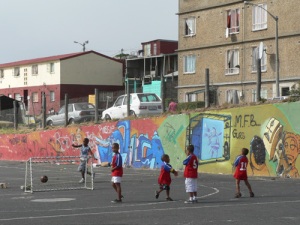
Children from Hout Bay are kept off the streets with soccer, in the Stars in their Eyes project.
Ironically, even though South Africa will be hosting the 2010 Fifa World Cup in less than a year, physical education is deprioritised in schools across the country. The benefits of sport for one’s well-being are disregarded.
This was the opinion of guests at a colloquium hosted by the Social Transformation Programme of the Department of the Premier, on Thursday the 25 June. The goal of the colloquium was to address the issue of how sport could contribute to social transformation.
The colloquium consisted firstly of a panelist discussion, where key stakeholders and academics working within the arena of sport and transformation put forward their views on sport as a mechanism for social transformation. Both the achievements and challenges at a policy level and grassroots level were raised.
Following the panelist discussion the floor was opened to the guests for comments. The floor’s diverse composition made for an insightful discussion. An interesting point to arise from the discussion is the fact that physical education is no longer included in the South African school curriculum.
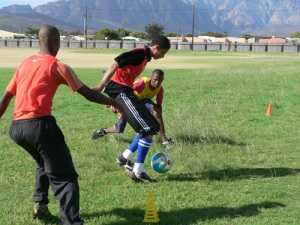
Sport has many benefits and should be practised in schools.
Luckily, with South Africa’s responsibility as host of the 2010 Fifa World Cup, sport has been pushed up the priority list, for example with the Stars in their Eyes project that aims to uplift children in priority areas through soccer. However, sport needs to be prioritised even more. South Africa’s hosting of the 2010 Fifa World Cup should be used to put sport back into schools.
While doing an evaluation of the Stars in their Eyes project, Development Works explored the many benefits that sport has for children. It does not only keep them physically healthy, but also keeps them from the streets, gangs and drugs, builds their self-esteem and teaches them to work hard within a team. This is very necessary.
Filed under: 2010 World Cup, children, colloquium, DEVELOPMENT WORKS, education, Policy, social transformation, sport, youth | Leave a Comment
Tags: 2010, 2010 Fifa World Cup, colloquium, curriculum, DEVELOPMENT WORKS, drugs, education, evaluation, gangs, grassroots, healthy, physical education, Policy, school, soccer, social transformation, Social Transformation Programme, sport, Stars in their Eyes, team, transformation
Women’s “resistance” to traditional gendered roles performed within the family structure, has led to “new” roles of performance in relation to work, marriage and childcare.
Throughout history certain norms were created determining gender roles. Women were perceived as the primary caregiver and men dominated in the workplace. Within the home these norms were learnt and thus maintained. In past decades this has apparently started to change with more women entering the working world.
This shift in women performing work outside the home is associated with the female claim to autonomy. But how free are women really, even in their new roles? This “autonomy claimed” in many instances is contradictory.
Women perform work within a gendered environment which reproduces the inequalities apparent within the ‘family’ and other social institutions. For example, look at the “glass ceiling effect” – the fact that women rarely reach prominent positions in a company due to discrimination. Also, very few women have yet been employed in male dominated areas such as the construction industry.
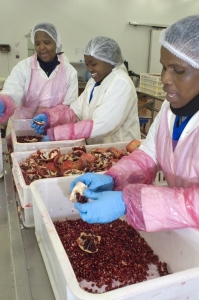
Photo by Chris Kirschhoff.
There is apparently a lot of attention paid to the unequal position of women in the workplace, but the policies and structures implemented by government to address inequality in reality furthers the persistence of gender inequality. According to the Basic Conditions of Employment Act, women are entitled to at least 4 months of Consecutive Maternity Leave, while men get 3 days Family Responsibility Leave. Does this not imply that the woman should stay at home and start raising the children while the man can go back to work almost immediately?
Top-down policy measures will not work as the historical construction of appropriate gendered behaviour is deeply rooted within the social fabric of society. It is only from “below” that this issue can truly be addressed.
Filed under: Employment, Family, feminism, Gender, governance, Inequality, Policy, power, rights | Leave a Comment
Tags: autonomy, basic conditions of employment, discrimination, Employment, Family, family responsibility leave, female, feminism, Free, Gender, gendered roles, glass ceiling, Inequality, jobs, maternity leave, Policy, unequal, women, work, working world, workplace
More than a decade ago, Archbishop Desmond Tutu defined Ubuntu as an ethic which is upheld by someone who ‘…has a proper self-assurance that comes from knowing that he or she belongs in a greater whole and is diminished when others are humiliated or diminished, when others are tortured or oppressed.’ In short, he described ubuntu as the essence of being human.
But what is the meaning of these words in the face of the mistreatment of refugees in South Africa? In front of the Department of Home Affairs, there are always refugees who have been sleeping on the pavement for days, trying to obtain an asylum seeker’s permit. They are not even allowed to use the building’s toilets and risk losing their place in line when seeking this service elsewhere.
Recently it was said in the news that a lorry reportedly carrying sewerage had sprayed effluent onto hundreds of desperate immigrants – young and old – at the Methodist Church refugee camp in Johannesburg.
For decades, refugees have been a significant feature of the South African landscape. South Africa has given official recognition to refugees, a move that has been highly appreciated. However, refugees have experienced varying degrees of acceptance or rejection as they strive to make a living in a foreign land.
The scenarios presented above and other untold stories, makes one wonder whether the ethics of Ubuntu will remain a political philosophy. Ubuntu calls us to place equal value on all individuals, to raise the voice of those who otherwise cannot do it for themselves. It defines what it really means to be a human being.
The Adonis Musati Project, for one, believes in the spirit of Ubuntu. Named after a young Zimbabwean who died of starvation on the streets of Cape Town, this organisation aims to support refugees in their endeavours to make a life for themselves.
The Development Works team hopes to support them as much as possible.
Filed under: Africa, Asylum seekers, basic human right, DEVELOPMENT WORKS, governance, NGOs, Philosophy, politics, poverty, Refugees, ubuntu, xenophobia, Zimbabwe | Leave a Comment
Tags: Adonis Musati Project, Archbishop Desmond Tutu, asylum seeker, Department of Home Affairs, DEVELOPMENT WORKS, discrimination, ethics, Methodist Church refugee camp, mistreatment, political philosophy, politics, Refugees, ubuntu, xenophobia
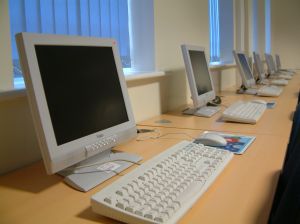
NGOs, CBOs, small business owners and even government are increasingly making use of Free Libre and Open Source Software.
If you still think that FLOSS is just something you do after you have brushed your teeth, you have not yet joined the ranks of those realising the benefits and potencial of Free Libre and Open Source Software (FLOSS).
“Free” means the software gives you “freedom”, but it is not necessarily always cost free. With FLOSS you can view the source code of a program and if you have the technical know-how, you can alter that code to enhance the program. With proprietary software the code is hidden. You are also allowed to copy and share Free and Open Source Software and do not need a registration code, as is the case with proprietary software.
The Free Software Movement, consisting of people who believed that if you love software you should set it free, started in the early 1980’s. It culminated in the Free Software Foundation, founded in 1985 by Richard Stallman. They are “dedicated to promoting computer users’ right to use, study, copy, modify and redistribute computer programs”.
Groups working on a tight budget such as non-governmental organisations, community based organisations and small businesses are increasingly making use of this type of software. Even government has realised the potencial of FLOSS, announcing in 2007 that they would migrate to Free and Open Source Software. However, they have not fully implemented the use of FLOSS yet.
Free and Open Source Software can also be used for education in resource-poor schools and by entrepreneurs trying to make a living. 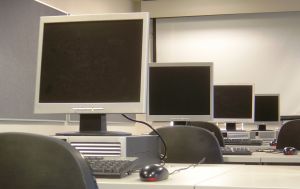
Members of the Development Works team attended Joomla training conducted by the organisation FLOSSnet last week. Joomla is Free and Open Source Software used to design and manage websites.
Filed under: CBOs, development, DEVELOPMENT WORKS, education, Entrepreneurs, governance, internet, media, NGOs, Small Business, Software, technology, Training | 1 Comment
Tags: CBO, Community Based Organisations, DEVELOPMENT WORKS, education, Entrepreneur, FLOSS, FLOSSnet, Free, Free Libre and Open Source Software, Free Software Foundation, Free Software Movement, freedom, Government, Joomla, Libre, NGO, Non-governmental organisations, Open Source, Open Source Software, OSS, proprietary software, Small Business, Software, source code, Websites
